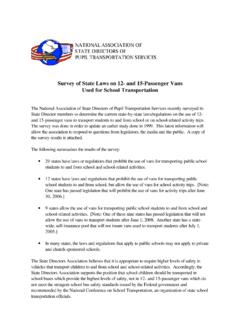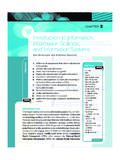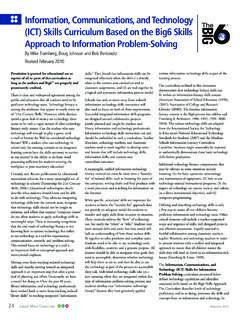Transcription of Information Report Sharing Student Health and Medical ...
1 Information Report Sharing Student Health and Medical Information with school Transporters by Peggy A. Burns, Esq. Background This Information Report is not intended to be an exhaustive discussion of records disclosure and confidentiality provisions, since there are multiple situations in which school transporters require Student Information in order to safely and efficiently carry out their responsibilities. Rather, it focuses on communicating to school transporters and special education directors the necessity -- and legitimacy -- of disclosure of Student Health and Medical Information . Included in the category of school transporters are transportation administrators, drivers, and other appropriate school transportation staff members, as well as bus contractors hired by school districts and educational units to transport students to and from school and school -related activities.
2 school transporters and special education directors are urged to seek legal advice regarding specific applications of this Information . It is critical that school transporters have relevant Health and Medical Information about the students who ride their buses, and in some cases it is legally mandated. Even where there is not a statutory or regulatory mandate to provide this Information to school transporters, any reasonable risk management analysis readily leads to the conclusion that the potential harm from failure to share this Information far outweighs any risk that a school district or contractor could incur as a result of transporters having this Information . Despite these facts, however, special education and other school personnel are often reluctant to share Student Health and Medical Information with school transporters. Many are adamant about their inability to provide Information about students conditions and needs which may impact travel on the school bus.
3 The reason -- misinformation about and/or misunderstanding of confidentiality requirements. 2 Questions Can school transporters legally receive Health and Medical Information about students who ride their buses? What factors should be considered in determining whether transportation personnel, special education personnel, Medical personnel and parents should collaborate to accomplish this Sharing of Information ? What are the prerequisites to the Sharing of Student Health Information with school transporters? How can compliance with these prerequisites be achieved? Discussion Application of relevant statutory and regulatory Information . Several clear, guiding principles emerge from an understanding of applicable law, especially the Regulations implementing Part B of the Individuals with Disabilities Education Act (hereafter, IDEA ), and the Family Educational Rights and Privacy Act of 1974 (hereafter, FERPA.)
4 Principle 1 -- Rationale for Disclosure When transportation is provided as a related service to a special education Student -- that is, because transportation is necessary for the child to access Individualized Education Program (IEP) services -- then transporters are related service providers. [See IDEA Regulations (hereafter Regs ), Section ] Under such circumstances, the school district must provide necessary Information to school transporters. That Information includes setting forth the role of transportation personnel in meeting the unique needs of the child as identified in his/her IEP, and those accommodations, modifications, and supports identified in the child s IEP which relate in any way to the transportation environment. [See Regs., Section (b) (2) and (3).] While the IDEA Regulations impose a mandatory duty on school districts when transportation is a related service, FERPA provides for broader permission to disclose Information about a child under two situations: 3(1) when a parent consents to the disclosure; or (2) when school officials have a legitimate educational interest, even when the district has not obtained such prior consent.
5 Who is a school official with a legitimate educational interest? When FERPA was modified in 1996, a Model Notification of Rights Under FERPA for Elementary and Secondary Institutions was included in Appendix B. That Model Notification clearly demonstrates Congressional intent as to who might reasonably be entitled to receive Student Information : A school official is a person employed by the District as an administrator, supervisor, instructor or support staff member..; a person serving on the school Board; a person or company with whom the District has contracted to perform a special task.. And, a school official has a legitimate educational interest if the official needs to review an education record in order to fulfill his or her professional responsibility. It is clear that school transporters meet this standard when Student Health and Medical Information is necessary to enable the safe and efficient transport of a Student .
6 Principle 2 -- Publication of List Under IDEA, school districts and contractors must publish a notice setting forth those staff members who will have access to Student Information . [See Regs., Sec. (d).] FERPA requires that school districts that share Information with staff members or contractors, recognized as needing Student Information , specify criteria for determining who will receive such Information and under what circumstances. These requirements are easily met by including in Student /parent handbooks a statement like the following, as suggested in Appendix B to FERPA: Federal law permits the school district to disclose personally identifiable Information in the Student s education records to school officials with legitimate educational interests. school officials include persons employed by the district as an administrator, supervisor, teacher, or support staff 4 member (including but not limited to.)
7 Transportation personnel..);..or a person, agency, or company with whom the District has contracted, or otherwise arranged to perform a special task or service.. Such individuals have a legitimate educational interest if s/he needs to review an education record in order to fulfill his or her professional and/or official responsibility. A legitimate educational interest also exists where the staff member or other individual works directly with students and needs to review education records to increase his/her awareness of steps necessary for the safety and welfare of students and staff members. Principle 3 Confidentiality The IDEA Regulations recognize that confidentiality requirements apply to the provision of necessary Student Information to school district employees and school transportation contractors. These requirements do not prohibit disclosure, but merely impose on the agency or institution that collects, maintains or uses personally identifiable Information , or from which Information is obtained the duty to protect the confidentiality of such Information at collection, storage, disclosure and destruction stages.
8 [See Regs., Sec. (a).] This duty is further defined by the FERPA requirement that a school district share personally identifiable Information from an education record only on the condition that the recipient of the Information will not disclose the Information to any other party without the prior consent of the parent or eligible Student . Principle 4 -- Training In order to receive Student Information which is otherwise confidential, school transporters must receive training -- like all other personnel who receive this Information in the course of their job duties. All related services personnel must be trained, and the Official Commentary to Section of the Regs specifically includes bus drivers among such personnel. The Regs further state that all persons collecting or using personally identifiable Information must receive training or instruction regarding limitations imposed by IDEA and FERPA and state policies and procedures which implement the disclosure and confidentiality provisions of these federal laws.
9 [See Regs., Section 300. 572 (c).] 5 The Bottom Line: Why Should school Districts Ensure That Pupil Transportation Official Have Access to Student Information ? Participation in IEP Meetings. As indicated above, the duty to inform is mandatory under IDEA Regulations when school transportation is provided as a related service. school transporters are essential participants in the decision which must be made as to whether transportation is a related service for a particular child. Section of the Regs. provides that a local education agency may include related services personnel as appropriate at the IEP meeting. Appendix A of the IDEA Regulations includes many useful questions and answers on this subject. The answer to Question 30 states: ..[I]t is appropriate for [related services personnel] to be included if a particular related service is to be discussed as part of the IEP meeting.
10 The answer to Question 33 states: In determining whether to include transportation in a child s IEP and whether the child needs to receive transportation as a related service, it would be appropriate to have at the IEP meeting a person with expertise in that area. That expertise will be most evident -- and most valuable -- when members of the IEP team have necessary Information about the needs of the Student . In its Letter to Smith (July 12, 1995), and in a number of letters and opinions since then, the Office of Special Education Programs (OSEP) of the Department of Education stated that the IEP must include more than a yes or no to the question, Is transportation a related service? Rather, it must include accommodation, modifications, and supports which must be provided for the child in accordance with his/her unique needs. Transporters are likely to be more aware of the availability of assistive technology devices applicable to transportation than anyone else on the IEP team, and certainly will have the responsibility to properly use such devices in response to the child s needs.













